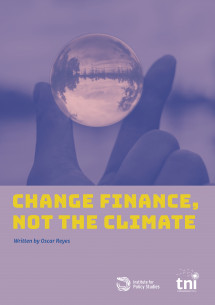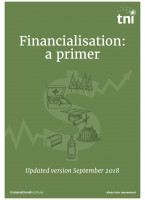Change Finance, not the Climate
This new handbook is an indispensable guide to climate activists and policy-makers alike towards a complete overhaul of the financial system to stop climate chaos. Central to its message is that fossil fuel lending can be redirected towards green energy and that public finance and ownership can bankroll and provide the infrastructure for delivering a Green New Deal.

Downloads
-
Executive summary - Change Finance, not the Climate (PDF, 981.65 KB)Average time to read: 4 minutes minutes
Authors
The book presents many progressive proposals to build a just and future-proof financial system that can respond to the climate crisis, assess their potential impact, achievability and any associated drawbacks. Climate activists are presented with a variety of financial tools to power a just transition, including:
- green bonds for public investment in a Green New Deal;
- credit policies by central banks and financial regulators to increase fossil-free lending and cut the flow of finance to the worst polluters;
- the creation of green development banks with a clear climate and social mandate to prioritize public and local initiatives;
- reforming company boards and introducing corporate charters that offer a legal vehicle to hold companies to account for the pollution they cause;
- divestment from fossil fuels, targeting insurance companies underwriting the coal sector as a first priority, and the development of climate investment strategies by public pension funds.
Decades of austerity have stripped the state of much of its capacity to invest through debt financing and undermined the tax base, allowing transnational corporations and a growing billionaire class to shift their profits and wealth beyond the reach of tax authorities. These trends must be reversed urgently, and power shifted back to democratically accountable public enterprises, to move rapidly towards a fossil-free world.
Summary of chapters
Focus: Central Banks
The problem: Central banks and financial regulators rarely take into account the huge consequences of climate change when setting the rules that govern private banks. Their quantitative easing schemes to print more money have bankrolled the financial sector and big polluters.
The solution: Central banks and financial regulators should be given a clear mandate to consider climate risks when making policies. Quantitative easing should be replaced by a massive programme of public financing for a Green New Deal, and major fossil fuel companies should be bought up and “decommissioned”.
3 key steps:
- Give central banks a climate mandate, requiring them to set policies that identify and ultimately constrain the “climate-related financial risk” taken on by the banking sector.
- Replace existing quantitative easing with a broader programme of public finance for a Green New Deal, issuing bonds to support public investment in renewable energy, energy efficiency and public transport.
- The US Federal Reserve should create money sufficient to buy up and “decommission” major US-based fossil fuel companies, while providing economic security for workers affected by the transition away from coal, oil and gas. Low stock prices and the precarious economic position of many companies during the COVID-19 crisis provides an opportunity to enact such measures.
Focus: Private Banks
The problem: Private banks are the biggest investors in fossil fuels.
The solution: Private banks should be more tightly regulated to set upper limits on lending to carbon-intensive industries and phase out fossil fuels, and minimum targets for “green” lending.
3 key steps:
- Develop green credit policies, establishing minimum requirements for the proportion of bank loans targeting “green” projects.
- Set mandatory upper limits on bank lending to carbon-intensive sectors, cutting off lending to the worst polluters.
- Break up the “too big to fail” banks, whose significant power acts limits the ability of governments to set environmental or social rules on who banks lend money to.
Focus: Public banks and banking alternatives
The problem: Public policy should encourage a financial system that affords more space to public banks, cooperatives and local savings banks, and ethical banks. Public investment and development banks could play a particularly important role in financing a transition away from fossil fuels, but strong democratic governance and accountability mechanisms need to be in place to avoid repeating the current and past failures of many such institutions.
The solution: Establish green development or investment banks as a focus for public financing of a transition away from fossil fuels, and legislate to encourage a more diversified financial sector that gives greater space to ethical banks, local savings banks and coops.
3 key steps:
- Establish green development or investment banks that offer concessional lending and grant support to renewable energy, energy efficiency or low-carbon transport infrastructure. These should have a clear mandate to prioritize public and local initiatives.
- Encourage the spread of cooperatives and local savings banks that have a public interest mandate.
- Support ethical banks, for example by creating tax incentives for green bank accounts.
Focus: Financial Markets
The problem: Financial markets are governed only by short-term profit motives and do not require firms to take responsibility for their climate impact.
The solution: There should be mandatory environmental, social and governance rules for firms listed on financial markets. Continuing divestment campaigns have already helped to undermine fossil fuel companies’ public acceptability.
3 key steps:
- Focus divestment campaigning on getting insurance companies out of the coal sector. The coal sector’s ongoing economic weakness makes it particularly vulnerable to divestment campaigning, and without insurance to underwrite the construction and operation of new coal power plants and mines, many would not be viable.
- Make it mandatory for investors and companies to make climate-related financial disclosures, so that the scale of their investments in fossil fuels and high-carbon industries is clear. This should include creating a taxonomy of sustainable (“green”) and unsustainable (“brown”) investments.
- Redefine the “fiduciary duty” of investors, requiring them to take climate concerns into account rather than simply taking a narrow, short-term view of profitability.
Focus: Transnational corporations
The problem: Transnational corporations are too powerful. They undermine efforts to transition economies away from fossil fuels by avoiding tax obligations, which drains public bodies of the resources to act. The way transnational corporations are established and run priorities the relentless pursuit of short-term profits with little regard for the environment or the needs of the communities in which they operate.
The solution: Transnational corporations should be required to run on more democratic lines, with changes in how corporate Boards are composed, and corporate charters that require accountability to the communities in which they operate. A new “unitary” global tax system is needed to overcome tax evasion and avoidance.
3 key steps:
- New corporate charters should be introduced that require large companies to act in the interests of workers, customers and the communities in which they are based. Shareholders would have the right to sue companies that ignore their social and environmental obligations.
- A new “unitary” global tax system is needed to ensure that corporations are properly taxed on their global income, regardless of where it has been earned.
- Multinational corporations should be required to allow workers to elect up to half of their Board members, helping to break up the the informal networks that currently tie big financial corporations to fossil fuel interests.
Focus: Public investment and public ownership
The problem: We urgently need investment in clean infrastructure that removes our dependence on fossil fuels, but the private sector has proven unwilling and unable to provide it. The public sector could and should play a lead role - it is far better placed than the private sector to develop and invest in new technologies, for example – but it is tied back by a lack of resources, and has been undermined by years of privatisation and austerity.
The solution: More public investment and greater public ownership, especially in the energy sector.
3 key steps:
- Greater public ownership of the energy sector, such as through the “re-municipalization” of privatized utilities or the creation of new companies. These companies, as well as existing public providers, should be given a public interest mandate that includes a requirement to invest in renewable energy infrastructure and rapidly phase out fossil fuels.
- Public pension funds should be required to consider environmental and social factors in reaching their investment decisions. This process should start with divesting from fossil fuels and assessing the “climate-related financial risk” of their whole investment portfolio to ensure that it is fully compatible with a 1.5°C climate target.
- Wealth taxes should be introduced to capture the riches of the billionaire class, as part of an overall strategy to increase the tax base.
To get involved, you can join the Change Finance coalition. This coalition, initiated by the Brussels-based Finance Watch together with more than 60 other organizations, coordinates campaigns, advocacy and other joint actions because fighting inequality and saving the planet starts with changing finance.


